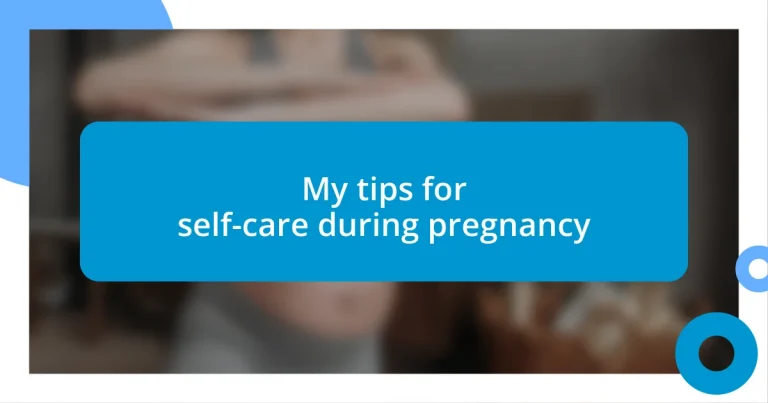Key takeaways:
- Self-care during pregnancy is essential for both maternal well-being and fetal health; it includes physical, emotional, and social support.
- Nutrition plays a critical role, emphasizing the importance of whole foods, hydration, and key nutrients like folic acid, calcium, and omega-3 fatty acids.
- Prenatal visits are vital for monitoring health, providing education, and fostering a supportive relationship with healthcare providers, which reassures and empowers expecting mothers.
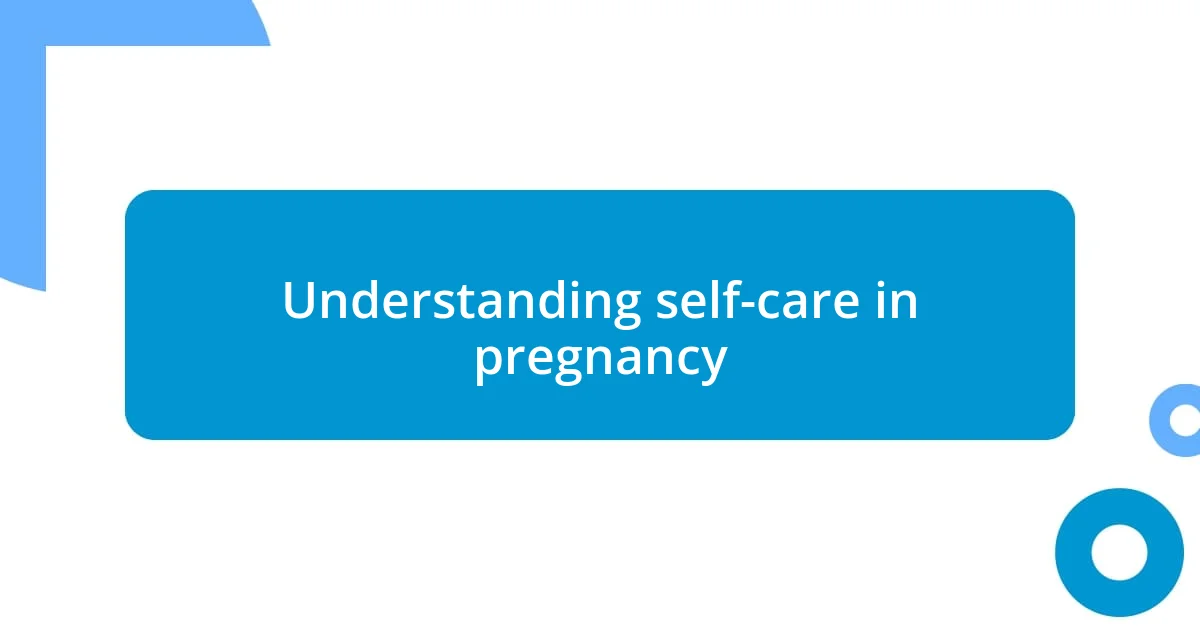
Understanding self-care in pregnancy
Self-care during pregnancy is not just a luxury; it’s an absolute necessity. I remember the overwhelming fatigue I felt in my first trimester, and it struck me how vital it was to prioritize my well-being during that time. Have you ever felt like your own needs get lost in the shuffle of preparing for a baby? It’s so easy to let self-care fall to the wayside, but nurturing yourself directly impacts your health and the developing baby.
I found that self-care practices provide a much-needed moment of connection with my changing body. Simple things like taking a warm bath or indulging in a favorite book brought me immense joy. What activities make you feel good? Tuning into those small pleasures can create a sanctuary amidst the chaos of pregnancy.
Understanding self-care in pregnancy means recognizing that it’s okay to ask for help and embrace support from loved ones. I was hesitant initially, but leaning on friends and family during those tougher days made a significant difference. Why should we bear the weight alone when there’s a whole network ready to lift us? Self-care isn’t just about physical health; it’s about emotional nourishment as well.
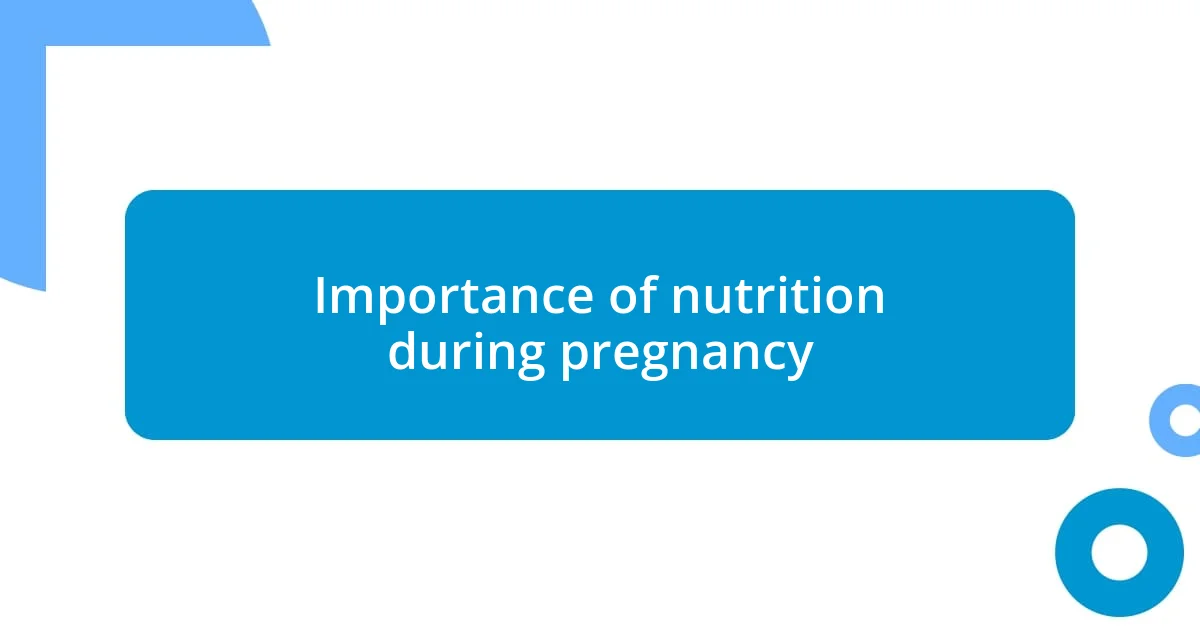
Importance of nutrition during pregnancy
Nutrition during pregnancy is a cornerstone of both maternal and fetal health. I clearly remember how excited I felt when I learned I was pregnant, but alongside that excitement came a deep concern about what I was eating. Have you ever felt overwhelmed by the choices available? Balancing cravings with nutrition can be tricky! It’s important to focus on whole foods, like fruits, vegetables, whole grains, and lean proteins, as they provide the essential nutrients needed for your developing baby.
During my pregnancy, ensuring I had enough folic acid was crucial. This B vitamin is vital for neural development, and honestly, I made it a point to incorporate foods like spinach and beans into my meals. It’s fascinating how certain nutrients play specific roles—like calcium for bone development and omega-3 fatty acids for brain health. Understanding the impact of these nutrients helped me make informed choices that I felt good about.
As I dove deeper into nutrition, I discovered that staying hydrated was just as important as the food I consumed. I remember carrying a water bottle everywhere I went, reminding myself that keeping hydrated helped with everything from digestion to energy levels. How did I manage it? I set little reminders on my phone, turning hydration into a habit. I believe it’s crucial to think of nutrition not just in terms of what we eat, but how we care for ourselves through balanced choices.
| Nutrient | Importance |
|---|---|
| Folic Acid | Essential for neural development & reduces the risk of birth defects. |
| Calcium | Supports fetal bone development and maintains maternal bone density. |
| Omega-3 Fatty Acids | Important for brain health and development. |
| Iron | Necessary for increased blood volume and provides oxygen to the baby. |
| Hydration | Supports digestion, nutrient absorption, and energy levels. |
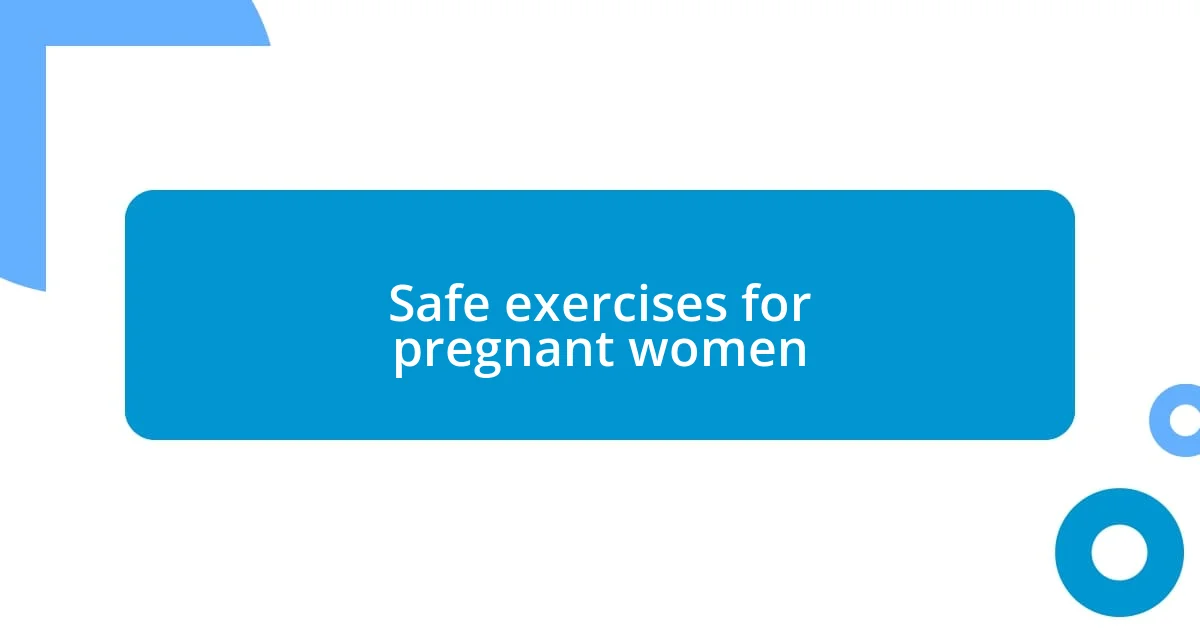
Safe exercises for pregnant women
Staying active during pregnancy can be challenging, but I found that safe exercises made a world of difference for my physical and mental well-being. I often felt overwhelmed, especially when uncertainty loomed, but engaging in activities like walking or prenatal yoga helped me regain some control. The gentle movements brought about a sense of calm and connection to my body that I truly cherished.
Here are some safe exercises I discovered to be beneficial during pregnancy:
- Walking: A simple way to keep moving, walking outdoors can lift your spirits and keep your body agile.
- Prenatal Yoga: This not only helps with flexibility but also teaches relaxation techniques that were invaluable during labor.
- Swimming: The buoyancy of water made me feel weightless, relieving pressure on my joints and allowing me to move freely.
- Strength Training: Light weights or resistance bands can help maintain muscle tone; just be sure to consult with a healthcare provider before starting.
- Pelvic Floor Exercises: These are fantastic for preparing your body for childbirth and supporting recovery post-birth.
I remember the day I attended a prenatal class; the energy in the room was contagious. It was comforting to see others share similar experiences and feelings. Engaging in these activities not only kept my body fit but also built a supportive community, reminding me that I wasn’t alone on this journey.
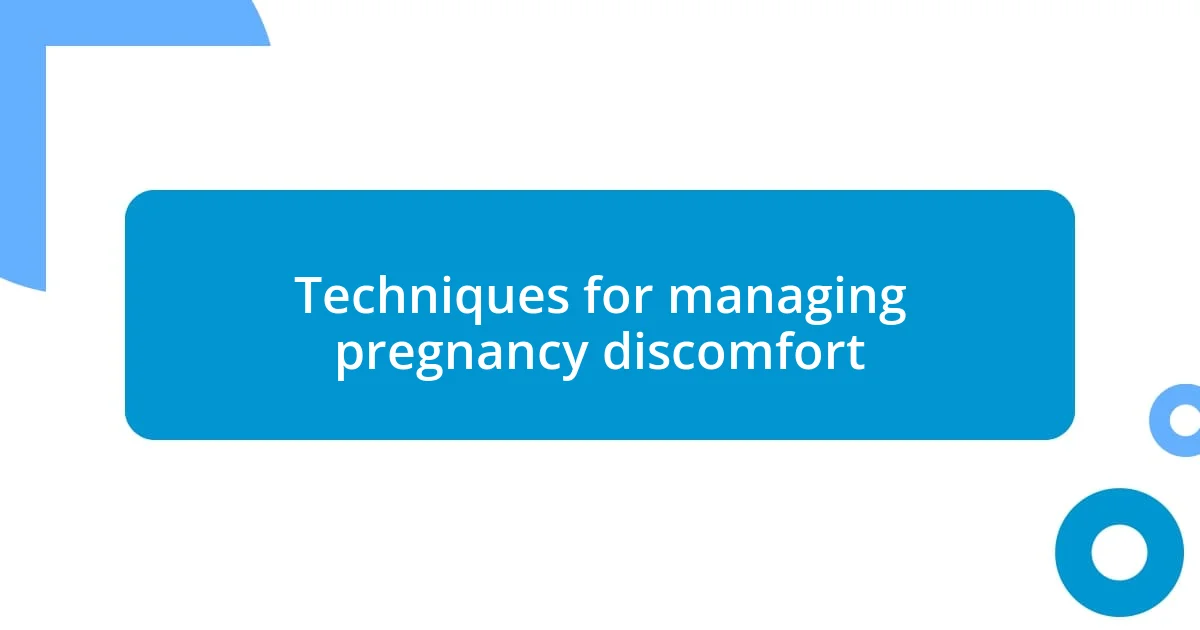
Techniques for managing pregnancy discomfort
I found that managing pregnancy discomfort required a combination of techniques tailored to my needs. One method I used was the power of warm baths with Epsom salts; those moments enveloped me in soothing warmth and eased the aches that often accompanied my growing belly. Have you ever felt the relief wash over you after a long day? It was a simple yet effective ritual that created a peaceful space to unwind.
Another technique that worked wonders for me was mindfulness meditation. When discomfort or anxiety crept in, taking just a few minutes to breathe deeply and focus on the present moment made a significant difference. I can still recall a particularly challenging night when my back pain flared up, and every deep breath became an anchor that kept me grounded. It’s amazing how mental focus can reshape physical experiences, isn’t it?
Lastly, I discovered the benefits of compression garments, especially during my later trimesters. Wearing supportive leggings and belly bands provided not only comfort but also reassurance that my body had the support it needed. I remember initially feeling skeptical about their efficacy, but after a few wears, I became a believer. Could something as simple as a piece of clothing truly change how I felt throughout the day? Absolutely—it’s all about finding what supports your unique experience.
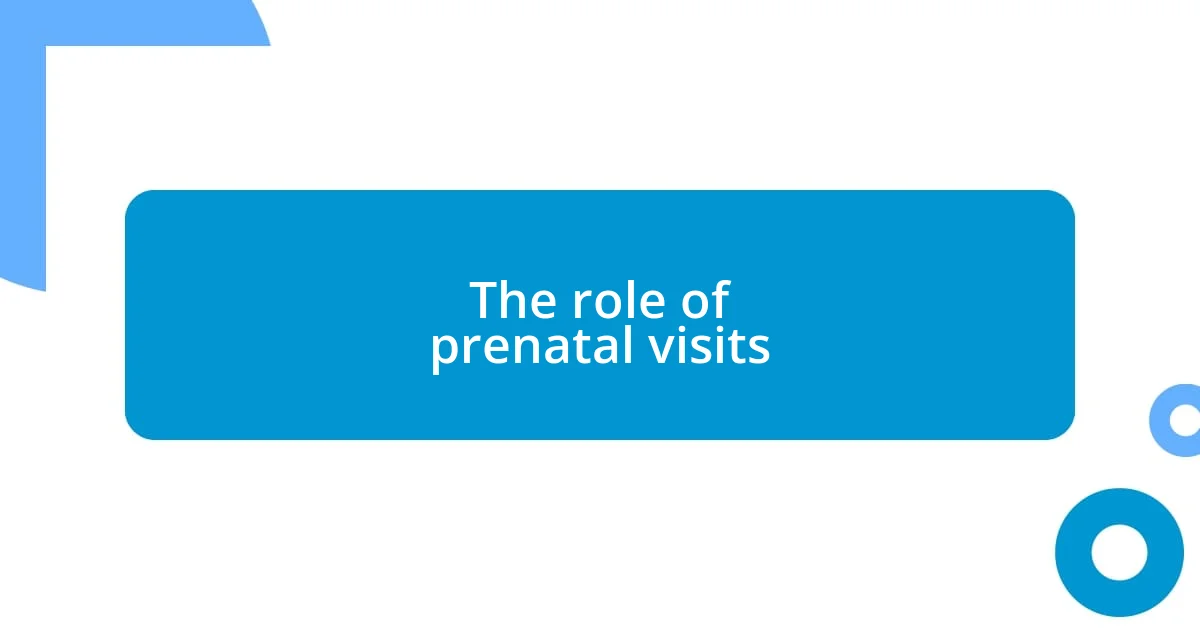
The role of prenatal visits
Prenatal visits are essential for everything from monitoring your baby’s growth to addressing any concerns you may have. Each appointment feels like a checkpoint, where I was able to discuss how I was feeling, ask questions, and receive tailored advice. Do you remember how comforting it was to see that little heartbeat on the monitor? Those moments of connection to my baby were absolutely priceless.
As I progressed through my pregnancy, I found these visits also provided a space for education. The healthcare professionals I met with shared invaluable insights about what to expect, including signs of complications and tips for a smoother journey. I can recall once feeling anxious about swelling in my feet, and just having that conversation put my mind at ease. It’s funny how a little reassurance can dissolve those worries, isn’t it?
Moreover, the relationships I built with my healthcare team during these visits were deeply reassuring. Knowing that I had a team of experts rooting for me not only boosted my confidence but also made me feel safe. It’s easy to feel overwhelmed; everyone has advice, but having a trusted source of guidance helped me sift through all the noise. Honestly, those regular interactions became a lifeline, and I genuinely looked forward to them.












